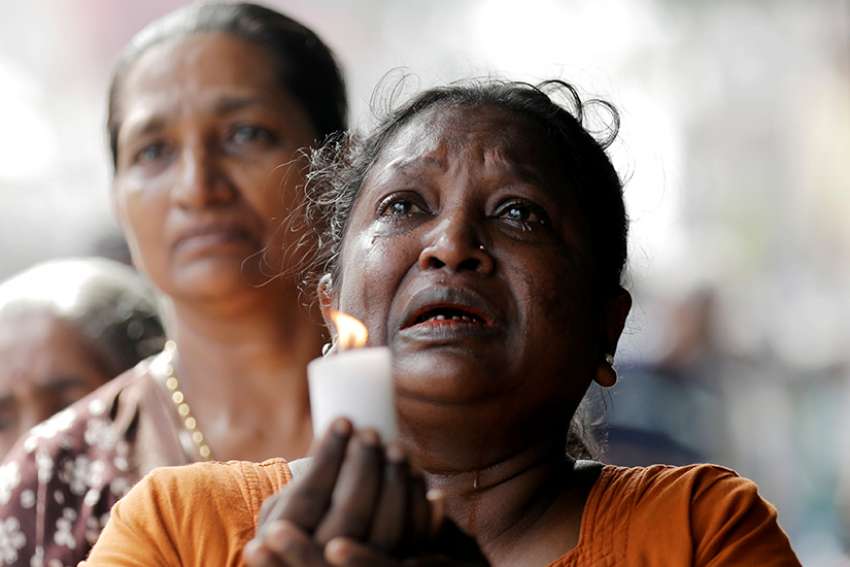"We placed our hands on our heads when we came to know that these deaths could have been avoided. Why this was not prevented?" Cardinal Ranjith told reporters. "The government should hold an impartial for inquiry and find out who is responsible for these attacks."
The cardinal traveled to the fishing village of Negombo, where more than 1,000 people gathered to mourn the dead in a service he led. The cardinal said at least 110 people were killed at St. Sebastian's Church in Negombo, north of Colombo.
"The security forces have not cleared the situation yet ... there could be more attacks on public gatherings," he told reporters. "I urge priests to not conduct any services at churches until I notify."
Sri Lanka Police Chief Pujuth Jayasundara issued a warning about the organization carrying out suicide bombings of prominent churches 10 days before the attacks, reported Agence-France Presse. It was unclear what action security forces had taken ahead of Easter in response.
Sri Lanka Prime Minister Ranil Wickremesinghe claimed he and other top government officials were not told and has said "we must look into why adequate precautions were not taken."
Sri Lankan Defense Minister Ruwan Wijewardene told Parliament: "The preliminary investigations have revealed that what happened in Sri Lanka (on Easter) was in retaliation for the attack against Muslims in Christchurch," New Zealand. On March 15, an Australian rifleman killed 50 people in New Zealand's worst-ever massacre.
Suspicion grew that international terrorist networks were involved in the Sri Lankan tragedy. On April 23, Islamic State claimed responsibility for the attacks, but the claim could not immediately be confirmed.
The government named two Islamic extremist groups, Jammiyathul Millathu Ibrahim and National Thowheeth Jama'ath, for the attacks that targeted three churches and three luxury hotels across the country, and authorities say they believe the bombers had help from offshore, a theory backed by experts. By April 23, authorities said they had arrested 40 people in connection with the bombings which not only killed more than 300 but injured more than 500.
The violence was the deadliest the country had seen since a 26-year civil war ended in 2009.
Two Catholic churches -- St. Anthony's Shrine in Colombo and St. Sebastian's Church in Negombo -- as well as an evangelical church in Batticaloa were targeted during Easter services. The Shangri-La, Kingsbury and Cinnamon Grand hotels in Colombo also were attacked.
"We do not believe these attacks were carried out by a group of people who were confined to this country," Health Minister Rajitha Senaratne said April 22. "There was an international network, without which these attacks could not have succeeded."
The majority of those killed and injured were Sri Lankan nationals, many of whom were attending church services. The government said those killed included at least 39 foreign nationals from the United States, United Kingdom, India, China, Japan, Australia, Turkey, Australia and other European countries.
Photos from the church bombings showed blood-spattered walls, broken glass and statues knocked on their sides.
Christians make up about 6%, or about 1.5 million, of Sri Lanka's population of 22 million, according to the country's 2012 census. About 85% of Christians are Catholic The majority of the population, about 70.2%, is Buddhist, while Muslims make up 9.6% and Hindus 12.6% of the population.
Pope Francis used his Easter Mass at St. Peter's Basilica at the Vatican to express his "loving closeness to the Christian community, targeted while they were gathered in prayer, and all the victims of such cruel violence."
"I entrust to the Lord all those who were tragically killed and pray for the injured and all those who are suffering as a result of this dramatic event," he said, expressing closeness to Sri Lanka's Christian community.
Bishops' conferences around the world, including those in the United States, Australia, Pakistan and Indonesia, extended their sympathy.
Damien Kingsbury, professor of international politics and a Sri Lankan expert at Deakin University in Melbourne, Australia, said there has been no history of Islamic terrorism in Sri Lanka. National Thowheeth Jama'ath surfaced on only on a few occasions in recent years in relation to hate speech and property-related attacks on Buddhist temples, he said.
"It's likely that recent return of Islamic State fighters to Sri Lanka had strengthened their resolve," Kingsbury told Catholic News Service. Earlier in April, the Sri Lankan government had identified a number of Sri Lankans who had returned to the country following the collapse of the so-called IS caliphate in Syria.
Experts noted that the precise coordination -- six explosions went off within 20 minutes of each other -- and the number of sites chosen for attack echoed the 2008 Mumbai assault on major hotels by an Islamic State-linked terrorist group.
The bombings have ended a decade of relative peace in Sri Lanka, a country with a long history of battling terrorism during civil war between government forces and the Liberation Tigers of Tamil Eelam.
A curfew was imposed in Sri Lanka from 8 p.m. April 22 until 4 a.m. April 23 local time. A national day of mourning was declared for April 23.
Support The Catholic Register
Unlike many other news websites, The Catholic Register has never charged readers for access to the news and information on our site. We want to keep our award-winning journalism as widely available as possible. But we need your help.
For more than 125 years, The Register has been a trusted source of faith based journalism. By making even a small donation you help ensure our future as an important voice in the Catholic Church. If you support the mission of Catholic journalism, please donate today. Thank you.


